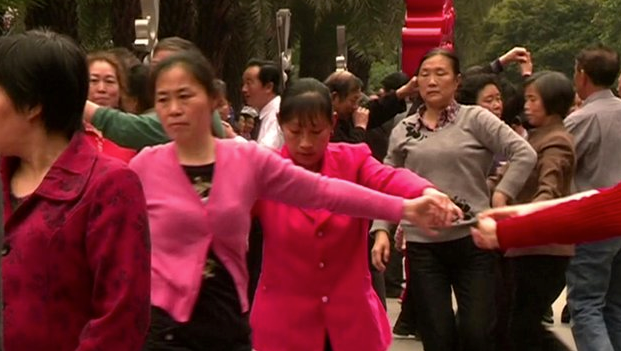By David Swedelson, Partner at SwedelsonGottlieb, Community Association Attorneys
 We often get calls from Board members and managers asking us to help them with noise problems. Usually, the complaints involve hard surface flooring, loud stereos or TVs, prolonged or loud dog barking, or a tenant who plays a musical instrument for several hours a day, especially on the weekend or in the evenings.
We often get calls from Board members and managers asking us to help them with noise problems. Usually, the complaints involve hard surface flooring, loud stereos or TVs, prolonged or loud dog barking, or a tenant who plays a musical instrument for several hours a day, especially on the weekend or in the evenings.
In China, which is apparently experiencing a condominium-building boom, they have a different kind of noise problem: public dancing to loud music. These aren’t raves; they’re daily occurrences. And the rowdy crowd isn’t twenty-something millennials. They’re grandmothers, women in their 50s and 60s, about 100 million of them. Even in China, this is not an inconsequential number. This was the subject of a recent article in the Wall Street Journal.
The dancing – whether it’s traditional, patriotic, or China’s version of rap or hip-hop, is a problem for people who choose to relax in quieter ways, and whose quiet enjoyment of their units is disturbed. Some paid extra for their units for the peace and quiet. Terms to buy a condo can be stiff in China. For example, in one complex, a $300,000 unit required 50% up front, and the balance within three years. These owners are arming themselves with decibel meters, and working to get laws passed to create “Quiet Zones”.
The lovely tree-lined common area in the center of the condominium complex can be transformed into a noisy, boombox dancefest for an hour or more beginning at 6:00 in the morning, and again after 7:00 in the evening. This would clearly be a nuisance, interfering with the other owners’ quiet enjoyment of their property.
Some of the solutions they have found for this problem in China would not work in the United States. For example, in the city of Liuyang, dancing cannot begin before 7:00 a.m. This is earlier than noise is permitted in most residential areas in California, either on weekdays or on weekends.
Section 13.45.010 of the Los Angeles County Code deals with “Loud, Unnecessary and Unusual Noise.” There are several criteria to determine whether something is a violation, including the level of the noise, time of day or night, duration, and frequency. The following section, 13.45.020, provides penalties for the violations.
CC&Rs go into deeper detail when defining noise violations. For example, standard in many CC&Rs are prohibitions on hard-surface flooring-wood, stone, tile-in upper units, hanging stereo speakers on walls, and Jacuzzis in individual units. The more specific your CC&Rs are about what constitutes a nuisance, the easier it will be to enforce them.
Other attempts to stop or regulate dancing throughout history have not been successful. In southern Italy, until the nineteenth century, people claimed they had been bitten by a spider and had to dance away the ill effects. The town was Taranto. The spider and the dance were both named after it: tarantula and tarantella, respectively. Lola Montez brought an erotic version, her famous Spider Dance to Gold Rush California. Lola danced in a saloon, not in a condominium common area. Even so, she caused a scandal.
There is a larger issue than noise here, because, as one dancer explained, the groups “use dancing to promote ideas about caring for children and the elderly.” When does a group of people congregating, even to do something as seemingly innocuous as dancing, become a political movement with an agenda? Or a gang?
Although “the right of the people peaceably to assemble” is protected by our Bill of Rights in the First Amendment, using the common area of a condominium for political purposes is prohibited.
Or could the answer to China’s noisy dancers be something as simple as headphones, the very ones made in China?
David Swedelson is a condo lawyer and HOA attorney, a community association legal expert. He can be contacted via email: dcs@sghoalaw.com
 HOA Law Blog
HOA Law Blog


